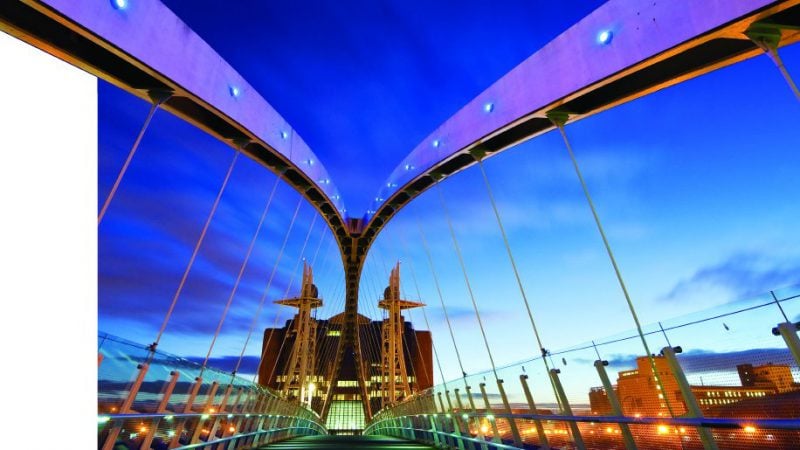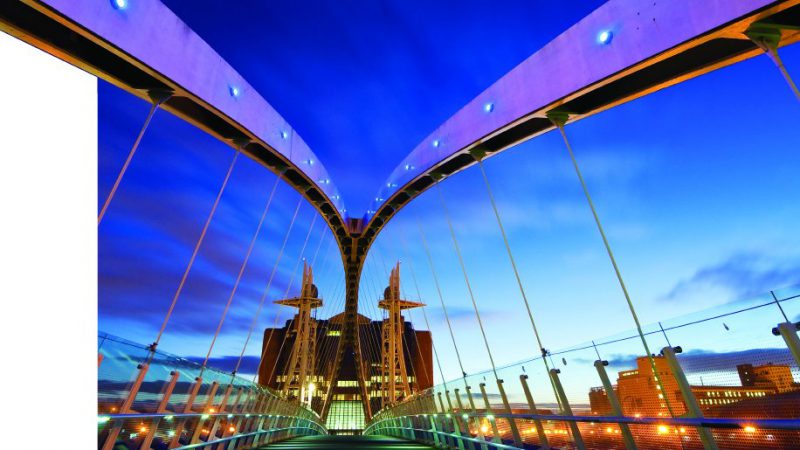Industrial Revelation
Travelers to Manchester feel the hum of history as well as an intellectual openness to things new and challenging
April 29, 2019


Talk to any Brit of a progressive persuasion and mention Manchester. You’ll see them visibly soften and warm, like a New York City pretzel on a coal fire. “Oh, I love Manchester,” is the standard return. For a particular type of person in the United Kingdom, Manchester is progressive Paris.
It’s all there: The long and illustrious history of the Labour Movement that started in this matrix of the Industrial Revolution in the mid-1800s. There’s the connection to Friedrich Engels, whose father owned one of Manchester’s textile works – “dark, Satanic mills,” as the poet William Blake described them. Engels’ response was to sit in Manchester’s famed libraries and try to work out a solution that would humanize the new 19th century realities of work and production.
There’s the widow, Emmeline Pankhurst and her daughters whose modest home across from a hospital became the meeting place for a new movement for women seeking the vote – the Suffragettes.
There’s also the legacy of the prominent progressive newspaper, The Manchester Guardian, in whose current online form, “The Guardian,” news stays un-paywalled and accessible to all.
“Manchester is the city where great minds meet,” says Sheona Southern, managing director of marketing Manchester. “It is a city of firsts and pioneering partnerships; where the atom was split, where Rolls met Royce, where the first programmable computer was created, where graphene was discovered, and where the first professional football league was introduced.” (Of course, that’s soccer to us Yanks.)
“It’s thanks to this incredibly rich history and heritage – and the impact it has had on the way Manchester now does things – that organizers want to bring events and meetings to the city,” Southern adds. “And it’s why Manchester consistently attracts exciting and forward-thinking events, continuing to host moments that matter.”
Some of these events include major, large-scale conferences set for 2019, particularly in the life sciences and healthcare sector, where the city is a leader in the number of major corporations doing business here.
In June, the city is the site of the 58th Annual Conference of the Particle Therapy Co-Operative Group, where experts will come together to discuss the latest developments in oncology and radiotherapy, and celebrate the centenary of Ernest Rutherford confirming the discovery of the proton – another Manchester first.
And in October, Manchester has been chosen as the meeting site for the 2019 Conservative Party Conference. The gathering is scheduled to be held in the former railway station, a place where rich and poor alike once streamed into the city called “Cottonopolis” because of its textile industry. Today the massive building has been turned major convention venue, Manchester Central. Whether you’re pro- or anti-Brexit, the event will be enthralling to watch.
It’s not just business travelers meeting in Manchester’s history-rich venues, massive and intimate, that create the buzz in the city.
Manchester is home to a robust communications and technology sector. Take lunch at the iconic renovated Victorian market hall, Mackie Mayor on Swan Street, and you’ll likely be next to one of the city’s 72,000 communications industry Mancunians (what city-dwellers call themselves). You might sit in on a conversation between a VP from Amazon and her equally highly-placed mate from Google, IBM or Cisco, all resident companies here.
The business climate in Manchester “mirrors, if not outperforms London itself,” says Richard Heyes, managing director of the digital marketing agency Tecmark. “It’s not just the business,” Heyes explains. “There’s a real sense of belonging here, even if you don’t originate from the city. After work hours, there’s plenty to do – restaurants and bars – but there’s also a rich history and culture in Manchester. Not to mention the boast-worthy music scene.”
The Beat Goes On
For business travelers with anything from a few hours to a few days to explore the city, Manchester’s music is a steady beat from which to draw inspiration.
Download a Spotify “Manchester” playlist, including famed bands like The Chemical Brothers, The Smiths, Joy Division and Oasis, and head out for an hour-long walking tour of the Northern Quarter. Here you can find music-related street art as well as second-hand record shops stocking original vinyl from Manchester-based Factory Records (which closed in 1992 but has left a cultural mark of pride on these streets).
Here too, you may see street art memorials to the victims of the 2017 terror bombing of Manchester Arena during an Ariana Grande concert. The 22 bees in the street art represent those who died in the attack. (The bee is one of the symbols of the city.)
Grande herself was made an “honorary citizen” of Manchester the year after helming her “One Love” concert to benefit victims and their families. It’s a mark of pride for city dwellers that resilience rather than retaliation was Manchester’s response to the tragedy. If you’re staying in the historic Radisson Blu Edwardian Manchester, in the city center, you’ll also be quartered in a major site of Mancunian music history.
The listed building and former Free Trade Hall was once a music venue where Bob Dylan first went electric and where the Sex Pistols sang “God Save the Queen” in 1976. If you’re lucky, you may find yourself staying in one of the hotel’s music suites named after Dylan, the Sex Pistols or David Bowie, who also performed in the Hall.
Music history is not the only watershed mark you’ll find in Manchester. You may end up at a special event at Old Trafford, the home of football legends Manchester United, where venues for executive meetings include behind-the-scenes tours of the stadium and dressing rooms of players (not while they’re there, of course). Manchester City and Etihad Stadiums also have similar experiences.
You might find yourself experiencing history at the city’s Science and Industry Museum, Jewish Museum or People’s Museum. They are part of a major cultural renaissance in the city. The Jewish Museum has just had an $8 million expansion. The Science and Industry Museum (where you can see an original Industrial Revolution-era mill working under its own steam) has also had an $8 million special exhibitions gallery recently added. All of these venues have bookable areas for private meetings or incentive groups, as well as being amazing sites for between-meeting musings.
Also part of the city’s cultural renaissance: The Factory, a $144 million theatre and arts center (permanent home of the Manchester International Festival where Yoko Ono and Philip Glass are on the bill for this June 4-24) and HOME, the new development for the city’s contemporary arts scene with its two theatre spaces, an art gallery and lively coffee shop.
History Around Every Corner
But for a bleisure stroll and private reflection, walk the cobbled streets of the city on your own for an afternoon.
Start at the new statue of Emmeline Pankhurst close to the Radisson Edwardian Blu Manchester in St. Peter’s Square. The bronze statue by Hazel Reeves was unveiled in 2018, the anniversary of the first British election in which a woman voted.
The statue stands on the spot where the tragic Peterloo Massacre of 1819 occurred when English cavalry attacked an unarmed group of protestors fighting for a voice in their government. The tragic event in which 15 people were killed and hundreds injured is remembered in director Mike Leigh’s 2018 film Peterloo.
Find out more about Mrs. Pankhurst and her daughters Sylvia, Christabel and Adela by visiting the intimate Pankhurst Centre. It was in this small family home where the Suffragette movement was born. You can sit in their historically reproduced parlor (with the actual typewriter upon which their manifestos were written) and soak up the excitement that agitating for women’s votes created. The Centre is also currently a refuge for women challenged with domestic violence issues.
Events around Emmeline Pankhurst’s fight for women’s voting rights can be seen in 2015 film, Suffragette, with Meryl Streep taking on the role of Mrs. Pankhurst.
Another silent but no less important monument to Manchester’s history is the John Rylands Library. The neo-Gothic treasure trove of human thought was built in 1900 by Enriqueta Augustina Rylands, the Cuban-born widow of John Rylands, Manchester’s first millionaire and a textile magnate.
The library’s massive reading room may remind you of something out of Harry Potter. The collection includes a Gutenberg Bible and the earliest texts (on papyrus) of the New Testament. The library was open to the public, a sign of Enriqueta’s commitment to her fellow Mancunians of all classes get access to books and preserve the city’s reputation as an intellectual powerhouse in the 19th century.
Finally, take in a concert and the stunning acoustics at Bridgewater Hall, the classical concert hall and home to the Hallé Orchestra, Manchester’s oldest, founded in 1858. The Orchestra’s first home was the Free Trade Hall where one can just imagine city denizens like Friedrich Engels and Emmeline Pankhurst and her daughters striding in to listen to a Beethoven symphony and later discuss “music and meaning” over tea in their parlors, like characters from E.M. Forster’s paean to turn-of-the-century social sensibilities, Howard’s End.
Here, as in so many places in Manchester, you feel the city’s palpable commitment to the life of the mind – and the right of every citizen to their own free thoughts.




